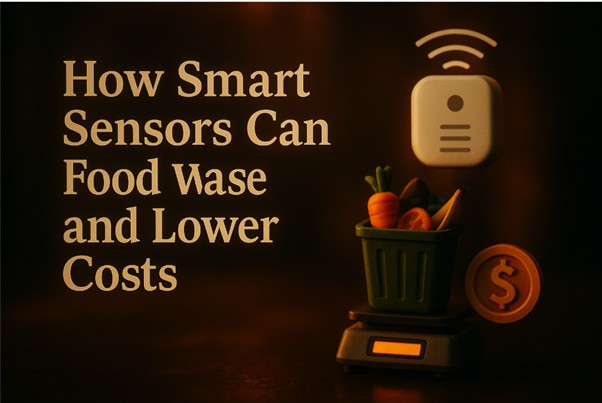
How Smart Sensors Can Reduce Food Waste and Lower Costs
In today’s fiercely competitive hospitality sector, restaurants continually seek innovative solutions to minimise waste, streamline operations, and manage costs effectively. According to Chef Shajahan M. Abdul, founder of Restro Consultants Pvt. Ltd. (RCPL), adopting cutting-edge technology, such as smart sensors, can dramatically reduce food waste and improve restaurant profitability.
Chef Abdul emphasises, “The smarter we operate, the better we serve our customers. Leveraging technology helps restaurants not just to survive, but thrive.” As we delve deeper into 2025, restaurant consultants increasingly recommend incorporating advanced smart sensors into daily operations. These intelligent devices collect real-time data, ensuring efficiency and cost-effectiveness.
Understanding Smart Sensors in Restaurants
So, what exactly are smart sensors, and why are top restaurant consultants endorsing them? Smart sensors are advanced Iot (Internet of Things) devices strategically installed throughout restaurant premises. They measure critical metrics, including temperature, humidity, gas levels, inventory levels, and food freshness, and transmit real-time data directly to cloud-based management platforms.
Chef Shajahan M Abdul, a passionate advocate for technology-driven restaurant management, believes these sensors represent a significant advancement. “When restaurant managers have real-time, precise data, making informed decisions becomes simpler. Smart sensors aren’t just a fancy trend—they are a fundamental requirement,” he asserts.
Reducing Food Waste Through
Intelligent Monitoring
A primary challenge restaurant
face today is managing perishable inventory. According to RCPL research, approximately
20-30% of purchased food products from restaurants are discarded. Smart sensors
tackle this issue directly.
These sensors continuously
track inventory levels and monitor storage temperatures. For example, if a
refrigerator door isn’t properly closed or temperatures deviate from
recommended levels, smart sensors instantly notify restaurant managers,
prompting immediate corrective action. Chef Abdul stresses, “Preventive
measures are far more effective and economical than reactive solutions. Quick,
real-time alerts allow restaurants to save substantial quantities of
inventory.”
Optimising Storage and
Inventory Management
Restro Consultants Pvt Ltd
(RCPL) has long advocated precise inventory control as the key to restaurant
profitability. Smart sensors significantly simplify inventory management by
automatically tracking stock and freshness. Sensors within storage units
precisely measure humidity, temperature, and shelf life.
Chef Shajahan M Abdul advises
restaurants to integrate smart sensors with sophisticated software systems to
automate stock management. “Automated inventory management systems driven
by sensors significantly reduce over-purchasing and under-utilisation of
ingredients. This leads to lower operational costs and higher
profitability,” explains Chef Abdul.
Ensuring Food Safety and
Compliance
Restaurants must meet stringent
food safety standards. Smart sensors help restaurants effortlessly comply with
health codes by continuously monitoring storage conditions and alerting
management if predefined standards are unmet.
According to restaurant
consultants at RCPL, employing sensors simplifies compliance reporting and
reduces the need for manual documentation. Chef Abdul notes, “An accurate
automated compliance system ensures consistent quality and strengthens customer
trust.”
Predictive Maintenance for
Kitchen Equipment
Restaurants depend heavily on
efficient equipment. Unexpected breakdowns are costly and can severely disrupt
operations. Smart sensors installed on kitchen appliances analyse performance
metrics to predict potential malfunctions.
Chef Shajahan M Abdul states,
“Predictive maintenance ensures kitchen equipment remains operational.
Smart sensors pre-emptively alert maintenance teams, substantially reducing
downtime and repair costs.”
Enhancing Efficiency in the
Kitchen
Efficient restaurant operations
rely on seamless workflows and effective resource utilisation. Smart sensors significantly
improve kitchen efficiency by optimising kitchen staff activities, cooking
processes, and equipment usage.
RCPL recommends sensors
integrated with smart appliances such as ovens, fryers, and grills. These smart
cooking devices sense food temperature and cooking time, automatically
adjusting settings to achieve perfect consistency, thereby significantly
reducing waste due to cooking errors.
Chef Abdul elaborates,
“Consistent quality delivered quickly increases customer satisfaction and
reduces food waste. Smart sensors make this achievable in daily operations”
Real-Time Data Analytics and
Strategic Decision Making
Beyond immediate operational
benefits, smart sensors offer robust data analytics capabilities. Restaurant
consultants highlight the importance of data-driven decision-making. Smart
sensors generate comprehensive data, revealing crucial insights about operational
patterns, inventory consumption rates, equipment usage, etc.
Chef Shajahan M. Abdul emphasises
that these insights greatly benefit restaurant owners and managers. “Data
empowers informed decisions on procurement, staffing, menu adjustments, and
marketing strategies. Using analytics proactively significantly improves
restaurant performance,” he asserts.
Implementation Challenges and
Solutions
While smart sensors offer
extensive benefits, implementing such technology presents some challenges. High
initial investment, employee training, and system integration complexities can
deter restaurants. However, the long-term savings substantially outweigh these
initial challenges.
Restro Consultants Pvt Ltd
(RCPL) recommends partnering with experienced restaurant consultants who guide
the seamless integration of intelligent sensors into existing workflows. Chef
Abdul underscores this point, saying, “Expert guidance simplifies
adoption. Proper training and initial setup support enable restaurants to
leverage technology to their advantage quickly.”
Future Prospects: The Era of
Smart Restaurants
Smart sensors represent a
significant step toward realising the innovative restaurant concept. By
integrating Iot technology, restaurants will increasingly become intelligent,
responsive, and efficient. As Chef Shajahan M Abdul forecasts, “Smart sensors
will soon become the standard rather than the exception. Restaurants embracing
technology today set themselves apart competitively for the future.”
In conclusion, smart sensors
offer revolutionary potential for restaurants looking to reduce waste, control
costs, optimise operations, and deliver consistent quality. Leading restaurant
consultants, including those at Restro Consultants Pvt Ltd (RCPL), strongly
endorse adopting smart sensor technology. Chef Abdul summarises it effectively:
“Smart sensors are not just an improvement; they’re a transformational
advancement shaping the future of restaurant operations.”
By incorporating smart sensors
today, restaurants position themselves at the forefront of culinary innovation,
ensuring sustainability, profitability, and long-term success.
Chef Abdul © Copyright 2024. All rights reserved.